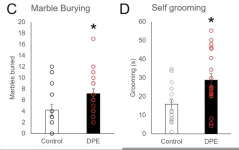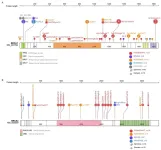(Press-News.org) With so many eHealth tools available, it can be challenging to select the best one for a specific health need. A recent study published in JMIR Human Factors provides valuable insights on how to choose quality eHealth tools in an evolving landscape of digital health technology. This study titled “Assessing the Quality and Impact of eHealth Tools: Systematic Literature Review and Narrative Synthesis” comprehensively examined how the quality and impact of eHealth tools are currently assessed.
Led by Dr Christine Jacob, a health tech researcher at the University of Applied Sciences and Arts Northwestern Switzerland FHNW, the study found that presently there is no single framework used uniformly to assess eHealth tools. Efforts to standardize assessment are faced with challenges, such as a lack of comparability and practicability, gaps in criteria completeness of the individual frameworks, validation issues, and regulatory complexity.
The researchers propose a new sociotechnical framework for assessing eHealth tools—this framework aims to balance different aspects of the health care ecosystem and considers potential implementation challenges. It classifies relevant assessment criteria into technical, social, and organizational categories and factors in the interplay between these aspects.
The findings from this study can be immensely valuable to clinicians, pharmaceutical executives, insurance professionals, technology providers, as well as policymakers. The authors hope that their work will help these stakeholders make more informed decisions about which eHealth tools to use, invest in or partner with, endorse to patients, or reimburse based on their potential quality and impact. Overall, this study provides a valuable resource for anyone looking to choose a quality eHealth tool.
“To make these results more accessible and usable to the relevant stakeholders, we will work with an expert panel including clinicians, patient advocates, eHealth providers, eHealth experts, Pharma executives, researchers, insurance experts, investors, and regulatory experts to co-create and validate an educational practical toolbox that aims to help raise awareness about the relevant assessment criteria for eHealth tools,” says Christine Jacob, the project lead and the first author of the study.
This is an innovation project sponsored by Innosuisse (the Swiss Innovation Agency), with the University of Applied Sciences and Arts Northwestern Switzerland FHNW as the research partner and F. Hoffmann-La Roche Ltd and KPT Insurance as the practice partners.
If citing original research article, please cite as:
Jacob C, Lindeque J, Klein A, Ivory C, Heuss S, Peter MK
Assessing the Quality and Impact of eHealth Tools: Systematic Literature Review and Narrative Synthesis
JMIR Human Factors 2023;10:e45143
doi: 10.2196/45143
PMID: 36843321
###
About JMIR Publications
JMIR Publications is a leading, born-digital, open access publisher of 30+ academic journals and other innovative scientific communication products that focus on the intersection of health, and technology. Its flagship journal, the Journal of Medical Internet Research, is the leading digital health journal globally in content breadth and visibility, and is the largest journal in the medical informatics field.
To learn more about JMIR Publications, please visit jmirpublications.com or connect with us via Twitter, LinkedIn, YouTube, Facebook, and Instagram.
Head office: 130 Queens Quay East, Unit 1100, Toronto, ON, M5A 0P6 Canada
Media contact: communications@jmir.org
The content of this communication is licensed under the terms of the Creative Commons Attribution License (https://creativecommons.org/licenses/by/4.0/), which permits unrestricted use, distribution, and reproduction in any medium, provided the original work, published by JMIR Publications, is properly cited.
END
SAN ANTONIO – April 25, 2023 – Southwest Research Institute (SwRI) has created a 3D simulation tool to test automated vehicles in virtual off-road environments modeled after real-world conditions. The research expands SwRI’s investment into software-in-the-loop solutions to test connected and automated vehicles (CAVs) in scenarios ranging from congested roadways to off-road terrain. A simulated environment, or a 3D “software loop,” supports evaluations of an infinite number of scenarios that would be cost-prohibitive to test in the real world.
The technology meets U.S. Department of Defense demands ...
A study of 72 mice mothers and their litters suggests a popular pesticide may cause neurodevelopmental disorders in humans. Previous studies have shown that nearly half of the risk for neurodevelopment disorders, including autism, is environmental, but few specific environmental causes have been clearly identified. James Burkett and colleagues exposed mice to low doses of pyrethroid pesticide deltamethrin during pregnancy and lactation. Pups of exposed mothers vocalized less compared to pups of unexposed mothers. ...
Homologous Recombination Deficiency (HRD) is a biomarker that predicts ovarian cancer treatment with PARP inhibitors or breast cancer treatment with first-line platinum-based chemotherapy. However, limited research is documented on platinum-based treatment prediction with HRD as a biomarker in ovarian cancer patients, especially in the Chinese population.
This first-ever China prospective cohort study, jointly conducted by BGI Genomics clinical researcher Dr. Shao Di and the Fudan University Shanghai Cancer Center team and published on the Journal of Ovarian ...
“Ted brings a wealth of knowledge and expertise in virology and human immune responses to viruses. He has played a key role in developing antiviral vaccines and furthering our understanding of important viruses transmitted by mosquitoes and ticks—arboviruses—and how neutralizing antibodies work against flaviviruses, such as Zika virus,” said Acting NIAID Director Hugh Auchincloss, M.D. “He is exceptionally well-suited to lead the VRC and its continued pursuit of innovative basic, translational and clinical discovery.”
Prior to his VRC appointment, Dr. Pierson served as a senior investigator and chief of NIAID’s Laboratory of ...
Brain Canada, Heart & Stroke, and the Canadian Stroke Consortium are thrilled to announce the recipients of the 2022 Stroke Clinical Research Catalyst Grants. The purpose of this program is to increase capacity for clinical stroke research within Canada, with an aim to reduce the burden of stroke, prevent recurrence, and improve patient outcomes through clinical research that will improve our understanding of stroke and advance stroke care.
“We are thrilled to be collaborating with two leading organizations ...
Gaithersburg, MD; April 25, 2023 - Cartesian Therapeutics, a fully integrated biopharmaceutical company pioneering RNA cell therapy for autoimmune diseases and cancer, today announced the appointment of three world-renowned scientists and engineers as charter members of the company’s Scientific Advisory Board (SAB): Prof. Jennifer Elisseeff (Johns Hopkins University), Prof. Andrés García (Georgia Institute of Technology), and Prof. David Mooney (Harvard University).
“These distinguished research leaders bring vast ...
A new class of immunotherapy shows promising results for fighting the most aggressive form of skin cancer.
The study, published today in Nature Communications by researchers from King’s College London and Guy’s and St Thomas’ NHS Foundation Trust, investigates whether a novel antibody can target and treat melanomas. The results show that the antibody activates the immune response to fight cancer and slows melanoma growth in mice.
Malignant melanoma is the most aggressive type of skin cancer with poor ...
What is shyness? Research has shown that shyness is characterized by fear and nervousness in response to social novelty and/or social evaluation. Shyness can manifest on behavioral, affective, and physiological levels, but little is known about how these components cluster. Longstanding theories note that shyness may be conceptualized as a trait that is relatively stable across development, which is described as temperamental shyness. Shyness may also be conceptualized as an emotion that is felt in a certain social situation, which is described as state shyness. To ...
Research shows that given the difficulties in navigating social relationships, children with more autistic traits might be prone to less attuned self-conscious emotions after transgression (displaying less guilt and embarrassment and more shame). A new study released in Child Development by researchers at Vrije Universiteit and the University of Amsterdam investigated for the first time the association between autistic traits and self-conscious emotions of guilt, embarrassment, and shame in young children.
Researchers also further examined ...
Social drinking after work is traditionally seen as an important way to build relationships in East Asia. There’s sometimes even a fear that missing out could leave you on the back foot when climbing the career ladder. However, a joint paper looking at the drinking habits and economic situation of working men in Japan, Taiwan and South Korea has found that those who can drink more do not seem to have a financial leg-up over their alcohol-intolerant and less-drinking colleagues. As almost half of the population in East Asia has some intolerance to alcohol, and with the growth of the sober-curious lifestyle, this result may come as good news to those ...




